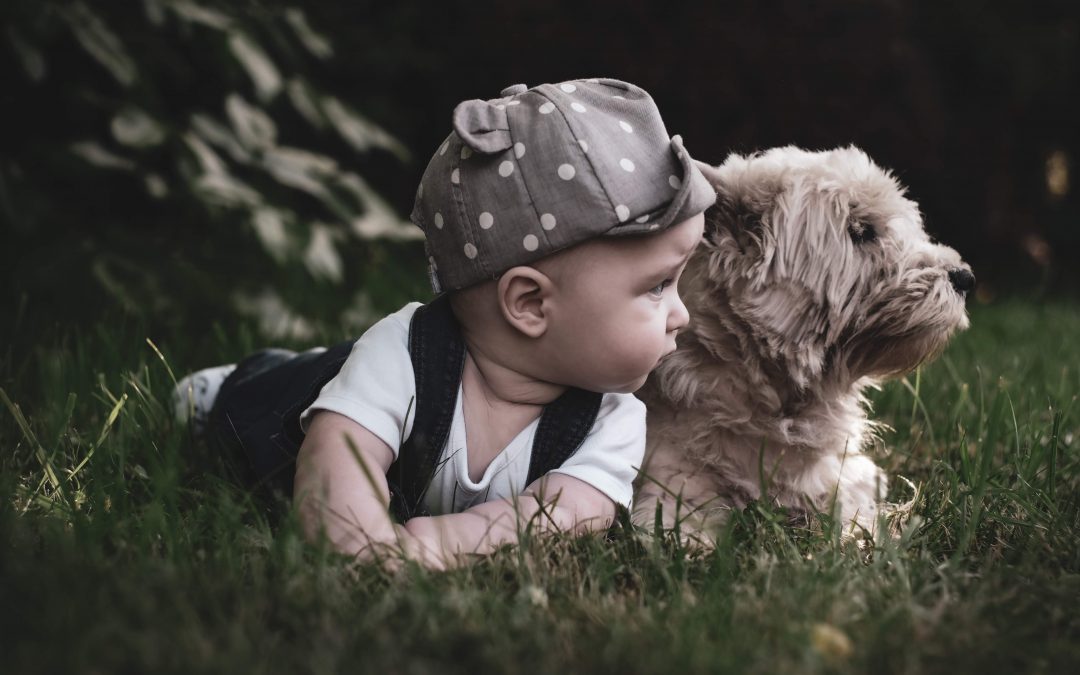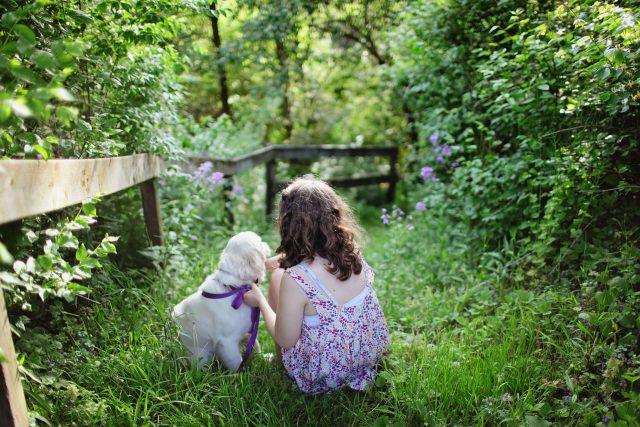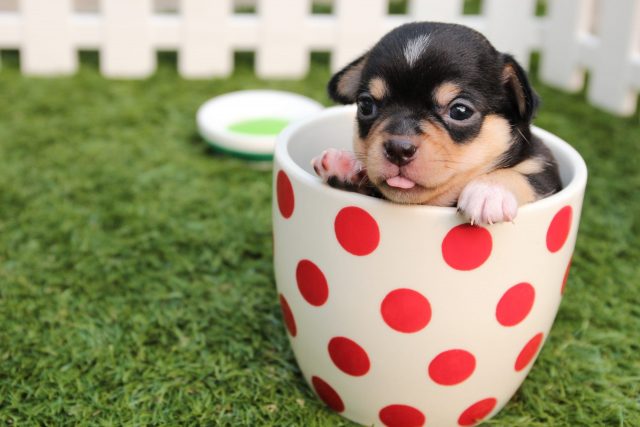A child’s dog is a friend who’s always in the mood to play; a companion who loves you even though you’ve been bad; a cure for being alone who will walk by your side or run by your bike mile after mile.
From a good dog, a child can learn valuable life lessons of kindness and responsibility, of devotion and respect for others.
For parents, the question is how to find that “good” dog. A dog that jumps on a child without warning and scratches him may only need some training. A dog that growls or snaps at a child may be unsuitable to be around children.
If adopting or purchasing a puppy, the choice of breeds is more open than if you procure an adult dog. That is due to some breeds that are fine with children if raised with them. However, when you adopt a teen or adult dog, you can see the personality and temperament of the dog much more clearly and match it to your child.
Dogs are bred for specific purposes and there are wide differences in their attitudes toward loud and sometimes noisy young children. For your child – and for the dog’s sake – it is important to choose wisely when getting a family pet. Many parents will choose a smaller dog as “safer” not realizing that many mid- and large-sized dogs are of a temperament better suited to children.
Very small dogs may not physically be able to tolerate the rougher treatment they may accidentally get from young children. This may result in a nervous, snappy dog or an injured one.
If choosing a dog from an animal shelter, don’t rely too heavily on first impressions of a dog caged in a kennel. The one who jumps repeatedly at the kennel bars trying to get your attention may be aggressive – or may be thinking “Oh boy, a kid to play with”. The dog who sits quietly and just watches you may be too shy – or may be a well-behaved animal.
To choose a shelter dog, make the first trip without your child. When a dog interests you, ask to take it out on a lead and spend a few minutes getting to know the animal. The body language of the dog can tell you a lot so don’t worry about trying commands, just spend a bit of time with it. Narrow your choices to 2-3 dogs and then come back with your child. Take those dogs out one at a time again and watch their reaction to this new young person. Trust your child’s instincts and as much as possible let him decide which pooch goes home. Children and dogs often seem to communicate in a way most adults do not hear.
The dogs listed below are the best breeds for families with children. Mixed breeds can be just as good or even better as they may have fewer health problems. Small mixed breed dogs may also be a bit sturdier than purebred.
The choice will also take into account the time you have available for training, grooming and exercise (yes, YOU, as you cannot trust the care of a living creature to a child without full oversight of the parent) as well as the space available in your home.
It is interesting to note that as the dog sizes listed below get larger the list of dogs well suited to small children also is larger. A large breed dog is more like to be of the Working Dog or Herding Group, calmer and more settled than Terrier and Sporting Dog relatives.
When choosing a puppy, don’t get carried away with cuteness if you can help it (and it’s not to be carried away). That precious St. Bernard mixed pup from the litter of your neighbor’s dog may be adorable – but realize that the grownup version will be around 130 lbs and will eat a lot of dog food.
At the other end of the scale, the tiny little pup that fits in the palm of your hand may be so small that it will be injured by normal childhood play.
If adopting from a shelter, look especially close at the dogs that are curious about you. These are dogs that will approach with tail wagging and ears forward but won’t be wildly barking. Watch their eyes, ears and tails. Do they listen and respond when you speak? If they approach cautiously when you hold your hand to the kennel, that’s fine – but if they slink into the corner in fear it may indicate a problem or abuse in their past. This can often be overcome, but when choosing a dog for children, it’s best to move on.
If your child is with you, some dogs will clearly exhibit child-friendly behavior. This is easily seen in mid- to large-sized dogs as they literally drop their head and usually the entire body profile is lowered slightly. This seems to be done instinctively by some dogs and sends a message of “no threat here”.
The dog will drop its shoulders and its head and the ears will usually lower to the side if it’s a dog with erect ears. The tail will wag slowly and be held low. This body language of child loving dogs is not breed specific and may be seen in a terrier or a huge German Shepherd.
Children who have no fear of dogs seem to recognize this posture quickly while the adults wonder what’s going on. It’s a great signal to watch for when choosing an adult dog as it indicates a dog submissive to and fond of children. Though this posture has been observed in dogs not yet mature, it is not seen in young pups.
The lists that follow are neither all-inclusive nor carved in stone but are good guidelines to use in your search. Remember that any dog needs to have basic obedience training – just as a child does.
Best Dog Breeds For Children
Under 10 Pounds
Great: American Eskimo Dog Havanese
Good: Bichon MinPin (Miniature Pinscher) Norwich Terrier
Older Children Only:
Chihuahua Dachshund (toy and mini)
Italian Greyhound
Japanese Chin
Maltese
Pekingese
Pomeranian
Toy Poodle
Yorkshire Terrier
From 11-20 Pounds
Great: Cairn Terrier Norfolk Terrier Norwich Terrier Schipperke Tibetan Spaniel
Good: Boston Terrier Jack Russell Miniature Schnauzer Miniature Poodle
Older Children Only: King Charles Spaniel Standard Dachshund Scottish Terrier Westie
From 21-50 Pounds
Great:
Cocker Spaniel
Australian Shepherd
Beagle
Bearded Collie
Brittany Spaniel
English Springer
Spaniel Keeshond
Shetland Sheepdog
Good:
Basset Hound
Border Collie
Ibizan
Wheaton Terrier
Snippet
Welsh Corgi
Older Children Only:
Airedale
Basenji
French Bulldog
Scottish Terrier
Standard Schnauzer
From 51-80 Pounds
Great:
Boxer
Bulldog
Collie
English Setter
Foxhound
Giant Schnauzer
Golden Retriever
Keeshound
Labrador Retriever
Old English Sheepdog
Pointer
Standard Poodle
Redbone Coonhound
Wirehaired Griffon
Good:
Chesapeake Bay Retriever
Chow Chow
Clumber Spaniel
Doberman Pinscher
German Shepherd Dog
Greyhound
Irish Setter
Older Children Only: Afghan Dalmatian Samoyed Weimeraner
From 81 lbs and Over
Great:
Bernese Mountain
Dog Bloodhound
Bouvier des Flanders
Irish Wolfhound
Newfoundland
Good:
Doberman Pinscher
Mastiff
Rottweiler
Saint Bernard
Older Children Only:
Alaskan Malamute
American Bulldog
Great Pyranees
Swiss Mountain Dog
Otterhound



